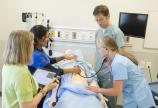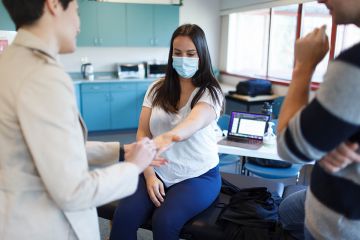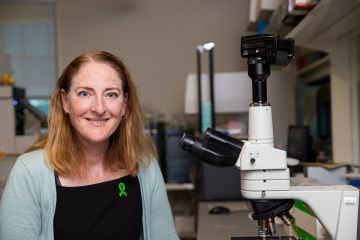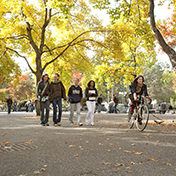New hospital simulation centre enhances health students' learning
Medical Sciences, Human and Social Development
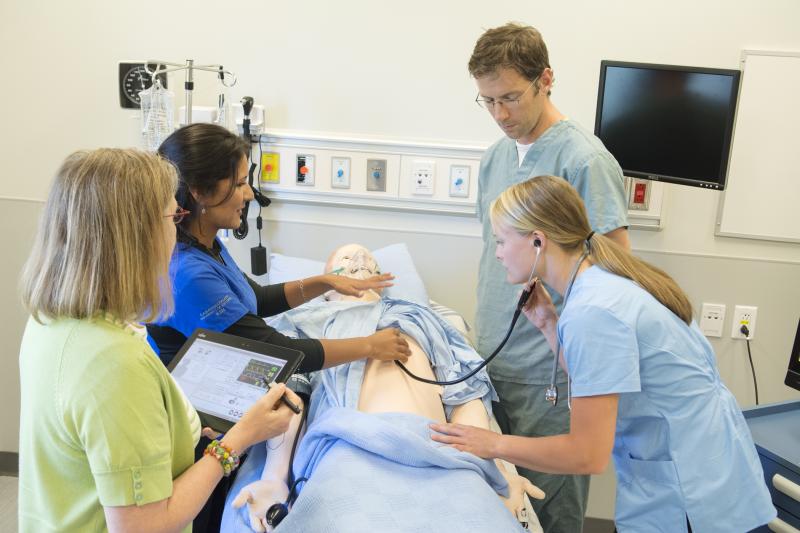
The tension in the operating room was palpable as the patient’s heart rate skyrocketed unexpectedly during surgery on her fractured ankle. Julie, the 19-year-old soccer player under local anaesthetic, worriedly asked what was wrong. The medical and nursing team reassured her as they quickly assessed and took action to stabilize her condition.
Despite its location in the Royal Jubilee Hospital, this was not a typical operating room. Nor was Julie a typical patient; she’s actually a life-like mannequin. Both are part of the new $2.9-million Centre for Interprofessional Clinical Simulation Learning, a partnership between UVic’s School of Nursing, UBC’s Faculty of Medicine and Island Health.
Three labs replicate an operating room, a critical care unit, and a patient care room. Technicians program the mannequins—each with a name, medical and social history—to simulate unanticipated medical scenarios that help students acquire relevant skills while under considerable pressure. The students also learn how to work as a multidisciplinary team.
“This centre will provide students with first class simulations tools, training in a realistic hospital environment and allow them to participate in complex simulations that will equip them with the skills necessary to provide the best possible care for patients,” says Dr. Valerie Kuehne, UVic’s vice-president academic and provost.
“Simulation training is nerve-wracking,” says Deb Snell, a UVic nursing student. “But I think it facilitates learning. You may be stressed but you know you have the knowled#8805; you just have to find the best way to apply it within the situation you are facing.”
“That’s exactly what we hope for,” says Dr. Anne Bruce, professor and associate director of graduate education in the School of Nursing. “Deb’s response tells us she has consolidated her knowledge to a point where she can apply her judgment effectively and immediately.”
Learners will take part in clinical scenarios that are as close to real life as it gets while allowing them to learn, and make mistakes, in a safe environment, says Dr. Bruce Wright, head of UVic’s Division of Medical Sciences and UBC’s regional associate dean, Vancouver Island. “The dynamic nature of this technology will help students and professionals alike develop their clinical skills, in real time.”
“Research shows team-based simulation learning is one of the most effective ways for us to meet this region’s unique needs in serving a growing, aging, and longer-living population,” says Dr. Taj Baidwan, executive vice-president and chief medical officer for Island Health. “We know high-functioning teams improve patient outcomes.”
At the Sept. 17 official opening, the contributions of three individuals who were instrumental in establishing the centre were acknowledged: Dr. Mary Ellen Purkis, former dean of the Faculty of Human and Social Development; Dr. Noreen Frisch, former director of the School of Nursing, and Dr. Oscar Casiro, former head of UVic’s Division of Medical Sciences and UBC’s regional associate dean.
Among those using the centre will be 128 students in the Island Medical Program, a partnership between UVic, UBC’s Faculty of Medicine and Island Health; 366 students with UVic’s School of Nursing and experienced health professionals who want to maintain or sharpen their skills. The centre may also be used to support health research projects.
You can read more about the centre at http://communications.uvic.ca/releases/release.php?display=back&id=226
Photos
In this story
Keywords: health, nursing, community, student life, teaching, industry partnerships

